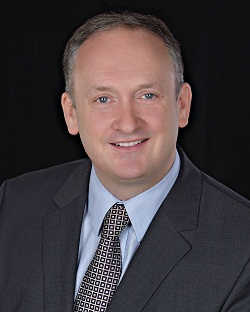Research Awards
Dr. Mark Clemons
Cancer Therapeutics Program
Winner of the Dr. Michel Chrétien Researcher of the Year Award
 Dr. Mark Clemons is a tremendously productive physician-researcher whose deep concern for his patients is at the root of his drive to conduct research. As a medical oncologist he takes great satisfaction in the role that research plays in helping his patients navigate the turbulent waters of a cancer diagnosis.
Dr. Mark Clemons is a tremendously productive physician-researcher whose deep concern for his patients is at the root of his drive to conduct research. As a medical oncologist he takes great satisfaction in the role that research plays in helping his patients navigate the turbulent waters of a cancer diagnosis.
"Our patients are often terrified to discover they have cancer, so it's important for me to be able to reassure them that, through research, we can help them make the best treatment decisions for themselves and their families," said Dr. Clemons, a medical oncologist at The Ottawa Hospital, a Clinical Investigator at the Ottawa Hospital Research Institute and an Associate Professor in the Department of Medicine at the University of Ottawa.
Passionate about improving the treatment options for his breast cancer patients, Dr. Clemons wants to provide them with tailored therapies that have the fewest side effects and best possible outcome. "It's about giving the right drug to the right patient at the right dose at the right time, so the patient can live longer and better," said Dr. Clemons.
To do this, many clinical assumptions need questioning and these questions need answering. Dr. Clemons is doing his utmost to tackle them.
Since arriving at The Ottawa Hospital from Toronto in 2009, he has published more than 55 papers and attracted $1 million to conduct clinical trials, exploring questions such as: "If someone's breast cancer poses a low risk of damaging the bone, can we improve their quality of life by reducing the dose and frequency of the treatment used to combat this damage?" The 2012 results from an initial clinical trial on this question indicate that, yes, this is likely the case. Dr. Clemons' team found that administering the drug pamidronate every 12 weeks to women in the low-risk group was as effective as administering it every three to four weeks, thus improving the quality of life for these women.
In 2012, Dr. Clemons published a paper in the Journal of Clinical Oncology that has changed practice around the world.
It started from a hunch, informed by his experience with his breast cancer patients. Breast cancer treatment uses therapies tailored to the molecular profile of a tumour — some requiring chemotherapy, some not.
"I knew intuitively that tumour cell behaviour had to evolve in patients with the passing of time and exposure to different treatments," said Dr. Clemons. "This challenged the clinical dogma of the time that, even if this did happen, a patient's care would remain the same if the cancer returned."
So he asked: What happens when breast cancer comes back and spreads to other organ? Does its profile change? Should physicians continue to assume that it will be the same as the original tumour? Could we avoid chemotherapy for some?
To answer this, Dr. Clemons designed a clinical trial that involved 121 women with metastatic breast cancer. He found that in nearly 40 per cent of cases, the cancer had changed, making it more or less susceptible to certain treatments. Doing a second biopsy to check the molecular profile of the secondary tumours resulted in better treatment for one in seven women in the study.
It is now considered best practice to check the molecular profile of breast cancer recurrence if possible. Indeed, this is increasingly being explored across a range of other cancer types in a series of ongoing studies in Ottawa and elsewhere.
Being able to provide the best, most compassionate care to individual patients drives Dr. Clemons, but research brings it to a whole other level. "I gain the greatest satisfaction when I see how studies that I have been directly involved in affect the care I can provide my patients."
